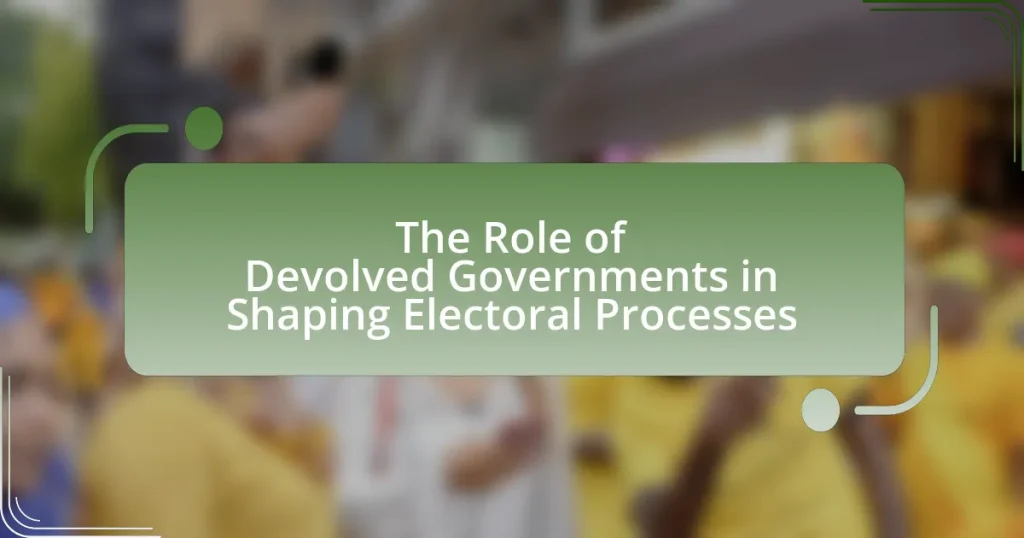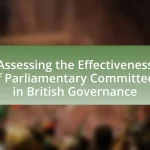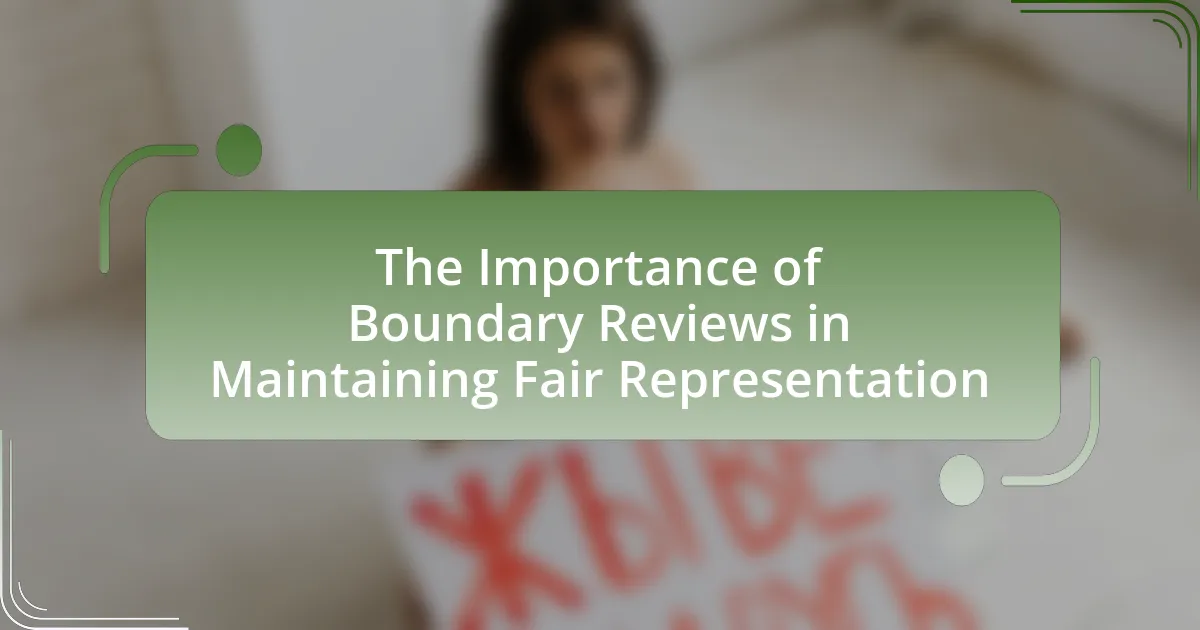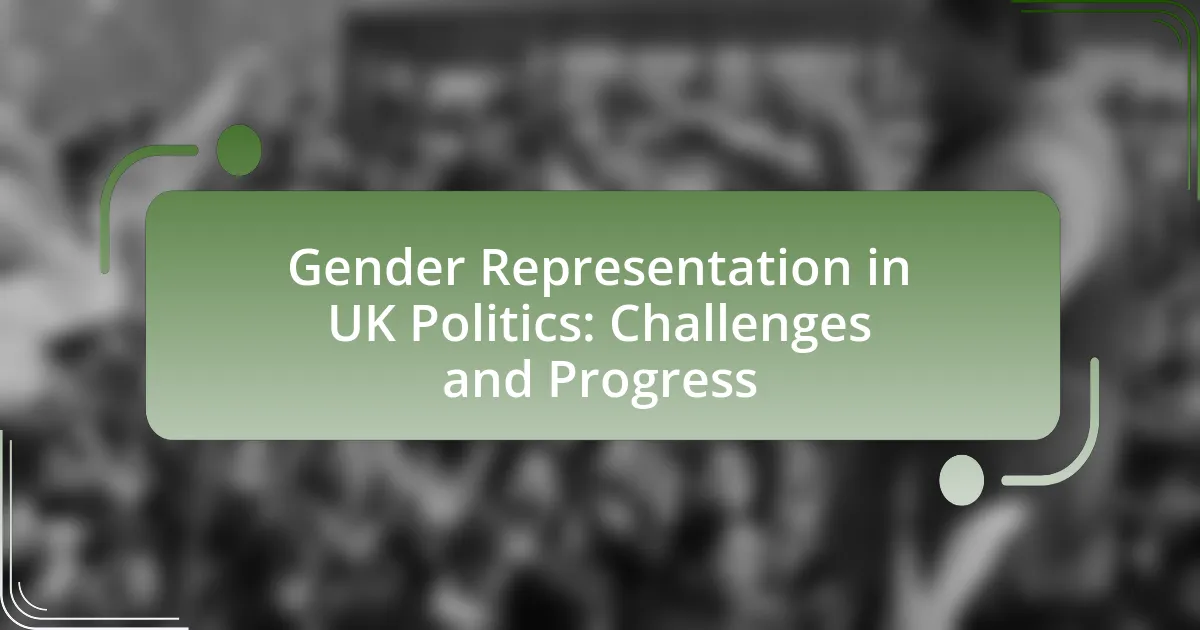Devolved governments, such as those in Scotland, Wales, and Northern Ireland, play a significant role in shaping electoral processes by establishing tailored electoral laws and regulations. They have the authority to determine voter registration, conduct elections, and manage electoral bodies, leading to distinct electoral systems that reflect local preferences. The article explores how these governments influence electoral frameworks, enhance voter engagement, and address regional electoral issues through legislative powers and public consultations. It also examines the challenges they face, including political conflicts and budget constraints, while highlighting best practices for improving transparency and increasing voter turnout.
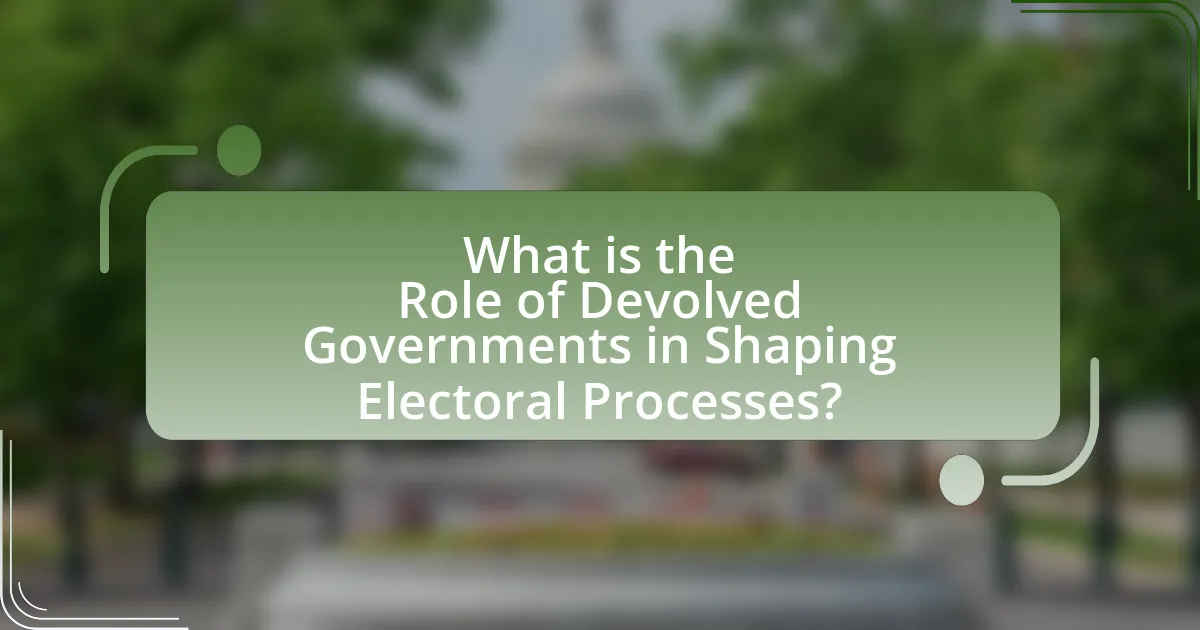
What is the Role of Devolved Governments in Shaping Electoral Processes?
Devolved governments play a crucial role in shaping electoral processes by establishing specific electoral laws and regulations tailored to their jurisdictions. These governments have the authority to determine the electoral framework, including voter registration, the conduct of elections, and the management of electoral bodies. For instance, in the United Kingdom, devolved administrations like the Scottish Parliament and the Welsh Senedd have implemented distinct electoral systems, such as the Additional Member System in Scotland, which reflects local preferences and political contexts. This autonomy allows devolved governments to enhance democratic participation and ensure that electoral processes align with the needs of their constituents.
How do devolved governments influence electoral frameworks?
Devolved governments influence electoral frameworks by establishing their own electoral laws and regulations, which can differ significantly from those at the national level. For example, the Scottish Parliament has the authority to set the electoral system for its elections, opting for a proportional representation system through the Additional Member System, which contrasts with the first-past-the-post system used in UK general elections. This autonomy allows devolved governments to tailor electoral processes to better reflect the preferences of their constituents, thereby enhancing democratic representation. Additionally, devolved governments can implement specific voter registration processes and electoral administration practices, further shaping the electoral landscape within their jurisdictions.
What are the key functions of devolved governments in elections?
Devolved governments play a crucial role in elections by managing the electoral processes within their jurisdictions. They are responsible for setting electoral laws, organizing elections, and overseeing the conduct of electoral activities. For instance, in the United Kingdom, devolved governments in Scotland, Wales, and Northern Ireland have the authority to legislate on electoral matters, including voter registration and the administration of elections. This decentralization allows for tailored electoral systems that reflect the unique political and social contexts of each region, enhancing democratic participation. Additionally, devolved governments ensure compliance with national standards while addressing local needs, thereby reinforcing the integrity and accessibility of the electoral process.
How do devolved governments differ in their electoral approaches?
Devolved governments differ in their electoral approaches primarily through the electoral systems they employ and the frequency of elections. For instance, the Scottish Parliament uses a mixed electoral system combining first-past-the-post and proportional representation, while the Welsh Senedd employs an additional member system, which also incorporates proportional representation. In Northern Ireland, the Assembly uses a single transferable vote system, promoting proportionality. These variations reflect the distinct political contexts and priorities of each devolved government, influencing voter engagement and representation. The differences in electoral approaches are further evidenced by the frequency of elections; for example, the Scottish Parliament and Welsh Senedd hold elections every five years, while local elections in Northern Ireland occur on a different schedule, impacting the political landscape and voter turnout in each region.
Why is the role of devolved governments significant in electoral processes?
Devolved governments play a significant role in electoral processes by enabling localized decision-making and representation. This decentralization allows for policies and electoral systems that reflect the specific needs and preferences of regional populations, enhancing democratic engagement. For instance, in the United Kingdom, devolved administrations in Scotland, Wales, and Northern Ireland have their own electoral systems, which can differ from the UK Parliament’s system, thus tailoring the electoral experience to their constituents. This localized governance structure has been shown to increase voter turnout and participation, as evidenced by higher engagement rates in devolved elections compared to general elections.
What impact do devolved governments have on voter engagement?
Devolved governments significantly enhance voter engagement by providing localized representation and decision-making. This proximity to constituents allows devolved administrations to address specific regional issues, fostering a sense of relevance and connection among voters. For instance, in Scotland, the establishment of the Scottish Parliament in 1999 led to increased voter turnout in subsequent elections, with participation rising from 60% in the 1997 general election to 50% in the 1999 Scottish Parliament election. This trend indicates that voters are more likely to engage when they feel their local concerns are being addressed directly by their representatives. Additionally, devolved governments often implement policies that resonate with local populations, further motivating citizens to participate in the electoral process.
How do devolved governments address regional electoral issues?
Devolved governments address regional electoral issues by implementing tailored electoral laws and regulations that reflect the specific needs and preferences of their constituents. For instance, the Scottish Parliament has the authority to establish its own electoral system, which includes the use of the Single Transferable Vote for local elections, ensuring representation that aligns with regional demographics. Additionally, devolved governments often engage in public consultations to gather input on electoral reforms, thereby enhancing democratic participation and addressing local concerns. This approach is evidenced by the Welsh Government’s recent reforms aimed at increasing voter accessibility and participation, demonstrating a commitment to adapting electoral processes to regional contexts.
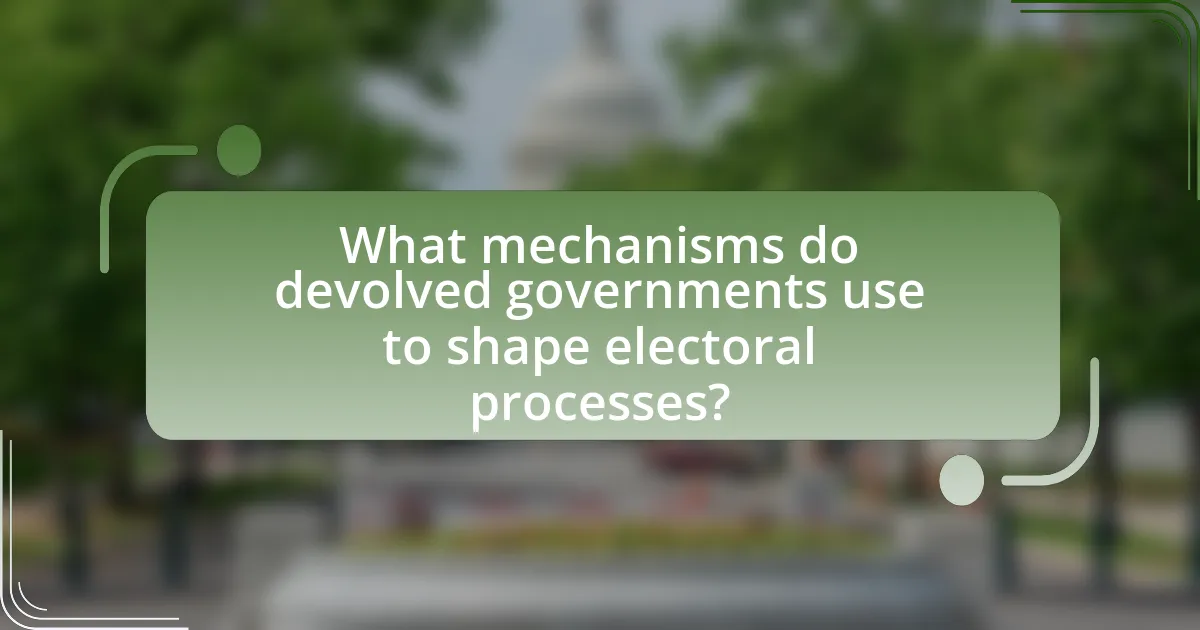
What mechanisms do devolved governments use to shape electoral processes?
Devolved governments shape electoral processes through mechanisms such as legislative authority, electoral commissions, and voter engagement initiatives. Legislative authority allows devolved governments to create specific electoral laws and regulations tailored to their regions, as seen in Scotland and Wales, where they have established distinct voting systems. Electoral commissions, like the Electoral Commission in the UK, oversee the conduct of elections, ensuring compliance with local laws and promoting fair practices. Additionally, voter engagement initiatives, including outreach programs and educational campaigns, are implemented to increase participation and inform citizens about the electoral process, thereby enhancing democratic engagement. These mechanisms collectively empower devolved governments to influence how elections are conducted and experienced within their jurisdictions.
How do legislative powers affect electoral regulations?
Legislative powers significantly influence electoral regulations by enabling governments to create, amend, or repeal laws governing elections. For instance, devolved governments in the UK, such as the Scottish Parliament and the Welsh Senedd, have the authority to establish their own electoral frameworks, which can include voter registration processes, electoral systems, and campaign financing rules. This autonomy allows them to tailor electoral regulations to their specific political and social contexts, as seen in Scotland’s implementation of proportional representation for its parliamentary elections, which differs from the first-past-the-post system used in the UK Parliament. Such legislative powers ensure that electoral regulations can reflect the unique needs and preferences of the electorate in different regions, thereby enhancing democratic participation and representation.
What specific laws have devolved governments enacted regarding elections?
Devolved governments have enacted specific laws regarding elections that include the Scotland Act 1998, which established the Scottish Parliament and allowed it to legislate on electoral matters, including the use of the Single Transferable Vote system for local elections. In Wales, the Government of Wales Act 2006 enabled the Welsh Parliament to set its own electoral rules, including the introduction of proportional representation for certain elections. Additionally, the Northern Ireland Assembly has implemented the Northern Ireland Assembly Elections (Amendment) Act 2016, which modified the voting process and eligibility criteria for Assembly elections. These laws demonstrate the authority of devolved governments to shape their electoral processes independently.
How do these laws vary across different devolved administrations?
Laws governing electoral processes vary significantly across the devolved administrations of the United Kingdom, specifically Scotland, Wales, and Northern Ireland. Each administration has the authority to legislate on electoral matters, leading to differences in voting systems, eligibility criteria, and electoral administration. For instance, Scotland employs the Single Transferable Vote system for local elections, while Wales uses the Additional Member System for its Senedd elections. Northern Ireland, on the other hand, utilizes the Single Transferable Vote for both local and Assembly elections. These variations reflect the distinct political contexts and priorities of each devolved government, as evidenced by the Scotland Act 1998, the Government of Wales Act 1998, and the Northern Ireland Act 1998, which grant these administrations the power to shape their electoral frameworks independently.
What role does public consultation play in electoral reforms?
Public consultation plays a critical role in electoral reforms by ensuring that the voices of citizens are heard and considered in the decision-making process. This engagement fosters transparency and accountability, allowing the public to express their opinions on proposed changes to electoral systems. For instance, in the United Kingdom, the 2011 Alternative Vote referendum was preceded by extensive public consultations, which informed the debate and shaped the final proposal. Such consultations can lead to reforms that better reflect the electorate’s needs and preferences, ultimately enhancing democratic legitimacy.
How do devolved governments gather public opinion on electoral changes?
Devolved governments gather public opinion on electoral changes primarily through consultations, surveys, and public engagement events. These methods allow them to collect diverse viewpoints from citizens regarding proposed electoral reforms. For instance, the Scottish Government frequently conducts public consultations, inviting feedback on electoral issues, which helps shape their legislative proposals. Additionally, the Welsh Government utilizes surveys to gauge public sentiment on electoral changes, ensuring that the voices of constituents are considered in decision-making processes. These approaches are essential for fostering democratic participation and ensuring that electoral systems reflect the preferences of the electorate.
What are the outcomes of public consultations in shaping electoral policies?
Public consultations significantly influence electoral policies by incorporating citizen feedback into decision-making processes. These consultations lead to more representative policies, as they allow diverse perspectives to be considered, ultimately enhancing public trust in electoral systems. For instance, research conducted by the Electoral Commission in the UK demonstrated that public engagement in policy discussions resulted in reforms that better aligned with voter expectations, such as changes to voter registration processes and accessibility measures. This evidence underscores the effectiveness of public consultations in shaping electoral policies that reflect the needs and preferences of the electorate.
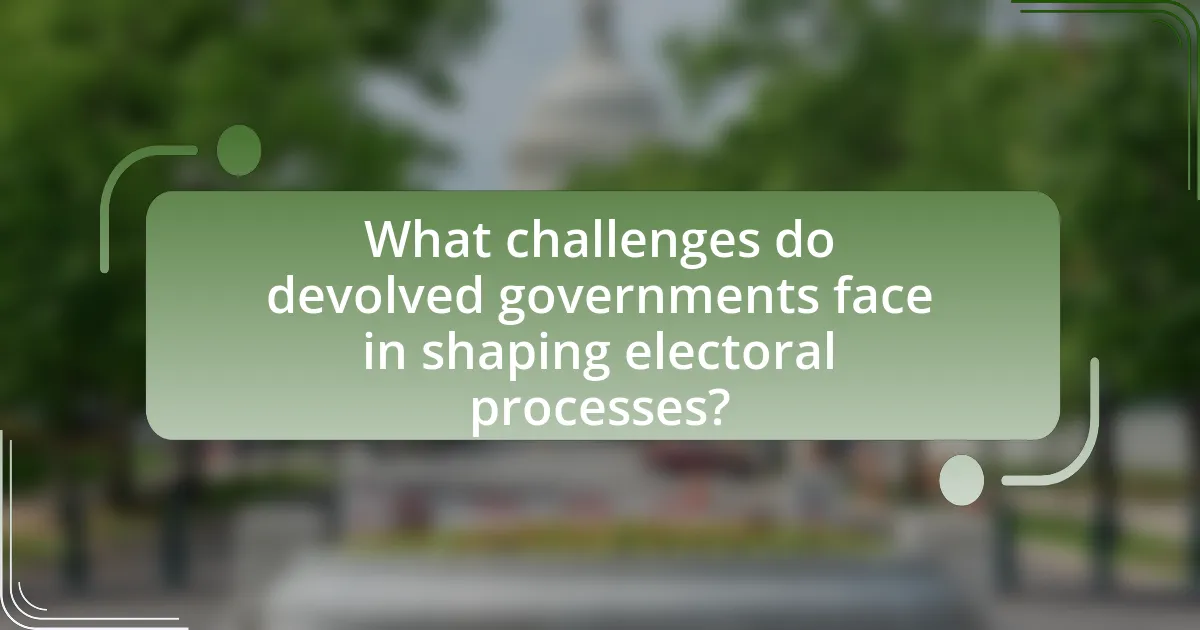
What challenges do devolved governments face in shaping electoral processes?
Devolved governments face significant challenges in shaping electoral processes, primarily due to limited legislative powers and varying political priorities. For instance, while they can influence local electoral laws, overarching frameworks set by central governments often restrict their autonomy. Additionally, differing political agendas among devolved administrations can lead to inconsistencies in electoral regulations, complicating voter understanding and participation. A specific example is the variation in voting systems used across the UK, where Scotland employs a proportional representation system, while England uses a first-past-the-post system, creating disparities in electoral outcomes and representation. These challenges highlight the complexities devolved governments encounter in establishing cohesive and effective electoral processes.
How do political conflicts impact electoral decision-making?
Political conflicts significantly influence electoral decision-making by shaping voter perceptions and party alignments. When conflicts arise, they often polarize the electorate, leading to increased partisanship and a focus on identity politics. For instance, during the Brexit referendum in the UK, political divisions over EU membership affected voting behavior, with many voters aligning their choices based on their stance on national identity and sovereignty. This polarization can result in shifts in party loyalty, as voters may gravitate towards parties that align with their views on the conflict, thereby altering traditional voting patterns. Additionally, political conflicts can lead to changes in campaign strategies, as parties may prioritize issues related to the conflict to mobilize their base and attract undecided voters.
What are the common sources of conflict among devolved governments?
Common sources of conflict among devolved governments include jurisdictional disputes, resource allocation disagreements, and differing policy priorities. Jurisdictional disputes arise when devolved governments contest the extent of their powers versus those of the central government, often leading to legal challenges. Resource allocation disagreements occur when devolved governments compete for funding and resources, which can create tensions over perceived inequities. Additionally, differing policy priorities can lead to conflicts, as each devolved government may pursue distinct agendas that clash with one another or with national policies, impacting areas such as education, health, and taxation. These conflicts are evident in various regions, such as the ongoing tensions between the Scottish Government and the UK Government over issues like Brexit and its implications for devolved powers.
How do these conflicts affect electoral integrity?
Conflicts undermine electoral integrity by creating an environment of distrust and instability, which can lead to voter suppression and manipulation. For instance, in regions experiencing political strife, such as during the 2019 elections in Venezuela, widespread violence and intimidation were reported, significantly affecting voter turnout and the legitimacy of the electoral process. Additionally, conflicts can disrupt the administration of elections, as seen in the Democratic Republic of the Congo, where ongoing violence hindered the ability to conduct free and fair elections, resulting in allegations of fraud and irregularities. These examples illustrate how conflicts directly compromise the foundational principles of electoral integrity, including transparency, fairness, and public confidence in the electoral system.
What are the implications of funding and resources on electoral processes?
Funding and resources significantly influence electoral processes by determining the extent of campaign outreach, voter engagement, and overall electoral competitiveness. Adequate funding allows candidates to invest in advertising, staff, and technology, which can enhance their visibility and effectiveness in reaching voters. For instance, a study by the National Bureau of Economic Research found that increased campaign spending correlates with higher voter turnout and greater electoral success. Conversely, limited resources can hinder candidates’ ability to communicate their platforms, leading to unequal opportunities among competitors. This disparity can result in skewed electoral outcomes, where well-funded candidates dominate the political landscape, thereby affecting the democratic process and representation.
How do budget constraints influence electoral reforms?
Budget constraints significantly limit the scope and implementation of electoral reforms by restricting financial resources available for necessary changes. When governments face tight budgets, they prioritize essential services over electoral improvements, often leading to stagnation in reform efforts. For instance, in many countries, limited funding has resulted in inadequate voter education programs and outdated voting technology, which undermines the integrity and accessibility of elections. Research indicates that nations with higher budget allocations for electoral processes tend to experience more robust reforms, as seen in the case of Canada, where increased funding led to the successful implementation of electronic voting systems. Thus, budget constraints directly impact the ability of devolved governments to enact meaningful electoral reforms.
What strategies do devolved governments employ to secure funding for elections?
Devolved governments employ several strategies to secure funding for elections, including public funding, fundraising events, and partnerships with local organizations. Public funding is often allocated based on electoral performance or specific legislative frameworks, ensuring that parties receive financial support proportional to their representation. Additionally, devolved governments organize fundraising events to engage constituents and raise money directly from supporters. Partnerships with local organizations can also provide financial resources and logistical support, enhancing the overall funding landscape for elections. These strategies are essential for maintaining electoral integrity and ensuring that all parties have the necessary resources to compete effectively.
What best practices can devolved governments adopt to enhance electoral processes?
Devolved governments can enhance electoral processes by implementing transparent voter registration systems. Such systems ensure that all eligible voters can easily register and verify their status, which increases participation rates. For instance, the introduction of online voter registration in various jurisdictions has led to a significant rise in registered voters, as evidenced by a 2018 study from the Pew Charitable Trusts, which reported that states with online registration saw a 10% increase in voter registration compared to those without. Additionally, devolved governments should adopt independent electoral commissions to oversee elections, ensuring impartiality and reducing the risk of fraud. Research from the International Institute for Democracy and Electoral Assistance indicates that countries with independent electoral bodies experience higher levels of public trust in electoral outcomes. Finally, investing in civic education programs can empower citizens with knowledge about the electoral process, further enhancing engagement and informed voting.
How can devolved governments improve transparency in elections?
Devolved governments can improve transparency in elections by implementing robust electoral oversight mechanisms and ensuring public access to election-related information. For instance, establishing independent electoral commissions can enhance accountability and provide unbiased monitoring of the electoral process. Additionally, making voter registration data and election results publicly available fosters trust and allows for independent verification. Evidence from the Electoral Commission in the UK shows that transparency measures, such as publishing detailed reports on electoral spending and procedures, significantly increase public confidence in the electoral system.
What innovative approaches can be implemented to increase voter turnout?
Innovative approaches to increase voter turnout include implementing automatic voter registration, utilizing mobile voting units, and enhancing digital engagement through social media campaigns. Automatic voter registration has been shown to increase participation rates significantly; for example, states that adopted this policy saw a 10% increase in voter turnout during elections. Mobile voting units can reach underserved communities, making it easier for individuals to cast their votes, while targeted social media campaigns can effectively engage younger voters, who are often less likely to participate. Research indicates that these strategies can lead to higher engagement and turnout, as evidenced by the success of similar initiatives in various jurisdictions.
